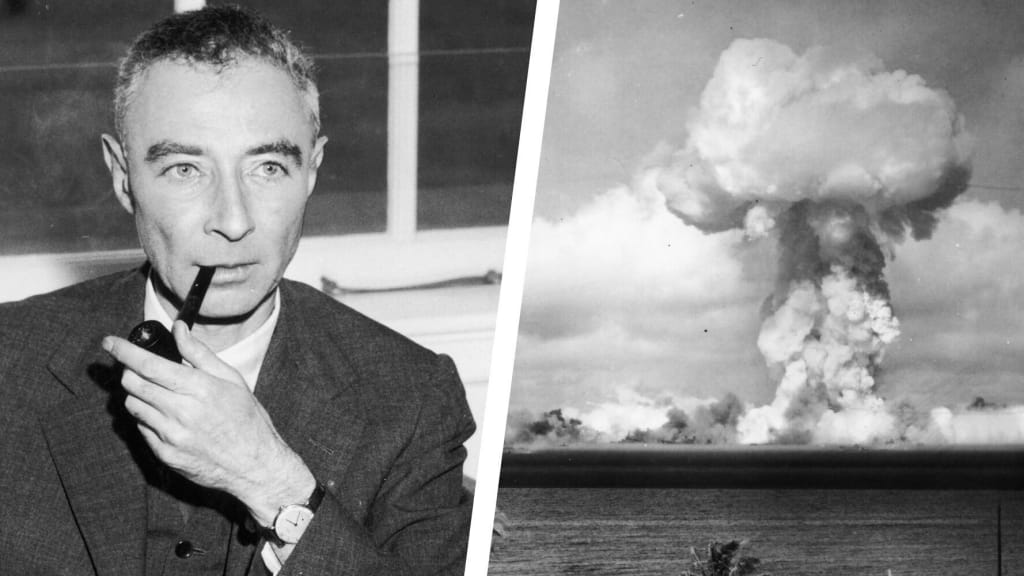J. Robert Oppenheimer: The Complex Legacy of the Father of the Atomic Bomb
Balancing Brilliance and Burden: The Complex Legacy of J. Robert Oppenheimer, Father of the Atomic Bomb

In the annals of history, few individuals have left as indelible a mark on the world as J. Robert Oppenheimer. Born on April 22, 1904, in New York City to wealthy German Jewish immigrants, Oppenheimer's remarkable intellect and prodigious knack for science and literature set him on a path that would eventually shape the course of human history. As the driving force behind the Manhattan Project, he played a pivotal role in the development of the atomic bomb during World War II. However, beneath the surface of Oppenheimer's achievements lay a life fraught with deep-seated conflicts and ethical dilemmas.
Oppenheimer's early life was marked by privilege and intellectual brilliance. His father's successful business ventures afforded him a life of luxury, with a New York penthouse adorned with masterpieces by Van Gogh and Picasso. Despite this, his childhood was marred by emotional struggles and social isolation. Bullied at school due to his boastful nature, Oppenheimer sought refuge in the world of science and literature, where he found solace and purpose.
After a brief stint at Harvard, Oppenheimer embarked on a transformative journey at Cambridge University, mentored by the legendary physicist Max Born. Despite his brilliance, he was plagued by a restlessness that led him to jump between various topics, often leaving important discoveries unfinished. One such example was his co-discovery of black holes and the photoelectric effect, concepts that would later become pivotal in the field of physics.
In 1941, Oppenheimer's life took a momentous turn when he was invited to join the Manhattan Project, the top-secret initiative to develop an atomic bomb. Despite being a theoretical physicist rather than an engineer, his intellect and charisma made him the perfect leader for this groundbreaking endeavor. The successful Trinity test on July 16, 1945, marked the first detonation of the atomic bomb, heralding the beginning of the atomic age.
However, with this success came profound ethical dilemmas. Oppenheimer was faced with the knowledge that the weapon he helped create would cause unimaginable destruction and loss of life. The dropping of the atomic bombs on Hiroshima and Nagasaki in August 1945 effectively ended World War II, but it also ushered in a new era of nuclear warfare and geopolitical tensions. Witnessing the devastation caused by the bombs troubled Oppenheimer deeply and gave rise to a moral struggle within him.
Post-war, Oppenheimer assumed a position of influence in shaping America's nuclear policy as the chairman of the general advisory committee of the atomic energy commission. He became an advocate for international nuclear control to prevent a global arms race and limit the spread of nuclear weapons. His opposition to the development of the hydrogen bomb, a weapon of even greater destructive power, set him at odds with influential figures in the American military and government.
As the Cold War intensified, suspicions about Oppenheimer's loyalty surfaced due to his past affiliations with left-leaning political organizations. These accusations culminated in 1953 when his security clearance was suspended, and a public hearing was held to determine his fate. The hearings were a spectacle that divided the scientific community and ultimately led to the loss of his direct influence on nuclear policy.
Despite the humiliation and loss, Oppenheimer remained a respected figure in the scientific world. His brilliance and contributions to physics were undeniable, but his true tragedy, as noted by his friend Freeman Dyson, was the squandering of his potential. His inability to focus and see scientific pursuits through to completion led to missed opportunities that could have further enriched the field of physics.
In his final days, Oppenheimer expressed remorse over the paths he had not taken and the scientific achievements he had foregone. The man once hailed as a genius struggled with the weight of unfulfilled potential, haunted by the knowledge of what could have been.
J. Robert Oppenheimer's life and legacy serve as a poignant reminder of the complex interplay between scientific achievements and ethical responsibilities. The development of the atomic bomb forever altered the course of history, and its consequences continue to resonate in the modern world. As humanity continues to explore the frontiers of science and technology, it is essential to approach innovation with mindfulness, responsibility, and a deep sense of humanity. Only by learning from Oppenheimer's journey can we strive for a future that balances the pursuit of knowledge with the preservation of human values.
About the Creator
Rohit Singh
Software developer, part-time content creator, and tech enthusiast.
Unleashing creativity and embracing tech. Join me on this thrilling journey! 🚀






Comments
There are no comments for this story
Be the first to respond and start the conversation.